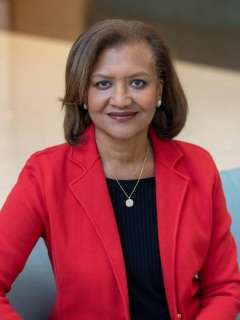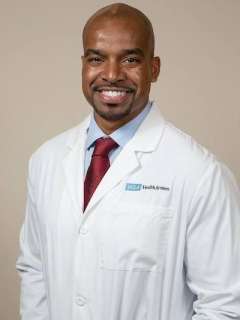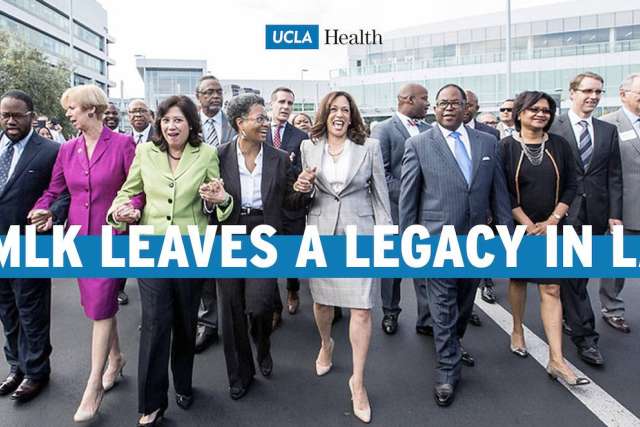“Of all the forms of inequality, injustice in health care is the most shocking and inhumane.”
– Rev. Martin Luther King Jr, 1966 Convention of the Medical Committee for Human Rights.
Half a century after Dr. King said those words, our health care systems are stretched thin due to the pervasive and ongoing parallel pandemics of COVID-19 and structural racism.
As institutions across the country grapple with ways to address disparities among low-income and vulnerable communities, UCLA Health looks to its recent history in helping to found health care system Martin Luther King, Jr. Community Hospital (MLKCH).
Dr. Elaine Batchlor, CEO of MLK Community Healthcare and the hospital within the system, says she hopes Dr. King would be pleased with what they’ve accomplished so far.
“The people that work in the hospital are talented, committed and passionate about serving a community that really needs it,” she says. “A good example is how we've been doing through the pandemic.”
The South L.A. area has been disproportionately affected by COVID-19. MLKCH, which licenses 131 beds, is currently serving more than 200 inpatients. The hospital has turned its post-anesthesia care unit and entire fifth floor into Intensive Care Units, moved patients into areas that formerly served as the gift shop and chapel meditation room, and erected five tents outside the hospital to assist with intake.
“Our staff has done a magnificent job,” Dr. Batchlor says. “They've been flexible, adaptive and creative.”
“While every hospital in Los Angeles has been stretched, we recognize the extraordinary challenges that MLKCH faces providing care to one of the most vulnerable communities in LA during this pandemic,” says Dr. Medell Briggs-Malonson, interim Chief of Health Equity, Diversity and Inclusion of the UCLA Hospital System and former senior medical director of quality for MLKCH.
“Having been part of the initial team to build and open MLKCH, I know the strength, heart, and resiliency of the hospital, its staff and systems, and the community it serves.”
Historical roots of MLKCH
The original idea to build a hospital in South L.A. emerged out of the need for health care resources and support following the 1965 Watts Rebellion – six days of unrest, 34 deaths, thousands injured and many more arrested. Afterward, Dr. King would visit Los Angeles to condemn the violence while pushing for systematic change for “those people in our society who have been by passed by the progress of the past decade.”
A report from the Governor’s Commission created by California Gov. Edmund G. “Pat” Brown and headed by John McCone, former director of the Central Intelligence Agency, cited areas to improve in South L.A., noting among them that “health care delivery systems were failing to meet the needs of South L.A. residents.”
In response, then 8th District L.A. County Supervisor Kenneth Hahn announced his intention to bring a hospital to the area. While some Watts community members didn’t believe a hospital in the area was necessary, antipoverty lobbyists and civil rights community leaders such as Ted Watkins supported the build.
Los Angeles County Southeast General Hospital – eventually renamed Martin Luther King, Jr. General Hospital – opened in 1971 under county operation to serve Compton, Inglewood, Watts, Willowbrook, Lynwood and adjacent areas. In 1982, the L.A. County Board of Supervisors approved renaming the hospital a third time, after it was joined with the Charles R. Drew University of Medicine and Science.
The Martin Luther King, Jr./Drew Medical Center arose amid “the same challenges we face today,” says Dr. Stan Frencher, MLKCH director of surgical outcomes and quality and associate professor of urology at UCLA Health. “The social determinants of health in 1960s South L.A. were economic disenfranchisement, lack of good schools, challenges with employment and inability to access health services and health care. That’s where King/Drew was.”
At its peak in 1999, King/Drew Hospital licensed more than 450 beds and served 150,000 patients a year. Deficiencies in management, quality oversight and accountability led to its loss of accreditation in 2005. The hospital officially closed in 2007, after failing an inspection by the Centers for Medicare & Medicaid Services (CMS).
A new chapter
A community health needs assessment (CHNA) conducted by Los Angeles County Department of Health designated large portions of South L.A. as a “medically underserved area,” aligning with federal designation as a health professional shortage area.

In 2009, the Los Angeles County Board of Supervisors and University of California regents approved a plan to build a new hospital to replace the King/Drew Medical Center. Infrastructure funding would come from the county, staffing and quality oversight from UCLA Health and a private, nonprofit team, Martin Luther King, Jr. Los Angeles Healthcare Corporation, would oversee the hospital’s operations.
By 2015, the Martin Luther King, Jr. Community Hospital was fully operational, with Dr. Batchlor, a physician with a Masters in Public Health from UCLA, at its helm.
In several interviews, Dr. Batchlor emphasized her focus was improve the health of the whole community.
That focus is what inspired Dr. Hamid Nourmand, MLKCH Chief of Staff and UCLA professor of clinical liver transplant anesthesiology who began his career working with underserved populations, to come to MLKCH. He would help lay the groundwork for the hospitals’ relationship.
When he first signed on as Secretary-Treasurer of the medical staff, one of his early tasks was to join hospital leaders in ensuring licensure certification.
Although the certification was anticipated to take at least five days, it concluded within less than half that time. “At the end of the second day, we gathered downstairs in the lobby and heard we were granted the licensure to open the hospital,” says Dr. Nourmand, now medical director of the MLKCH Anesthesiology Department and chief of the UCLA-MLKCH Anesthesiology Program. “Many of the people who I worked with at the time, they were crying with pride and happiness.”
Community impact
Along with anesthesiology, two other UCLA Health departments – radiology and urology – were among the first departments to help advance the partnership with MLKCH.
The UCLA Health Department of Radiological Services, in addition to providing staff, helped stand up MLKCH’s electronic medical records system and establish IT workflows.
UCLA Urology Chair Dr. Mark S. Litwin was among the first UCLA Health doctors to help staff the MLKCH urology department, and he brought on his mentee, Dr. Frencher, to assist with its development.

Dr. Frencher became one of the first physicians at MLKCH to both practice and serve in administration, a unique role he says allows him to leverage UCLA resources to give residents opportunities they wouldn’t get in Westwood.
“Doing community-based work requires that you spend time (in the community),” he says.
Dr. Desiree Sanchez, a fourth-year urology resident in the Department of Urology at UCLA, says she “lived through the challenges of growing up poor, with a teenage, single mom.”
Now she works with Dr. Frencher to understand how social factors can better guide patient management for South L.A. communities.
“There were a lot of families around the area that I grew up in, in Central California, that were struggling just to get the basic level of health care,” Dr. Sanchez says.
To address South L.A.’s systemic health inequities – made more visible by the COVID-19 pandemic – MLKCH emphasizes “complete care” programs and initiatives such as:
- Behavioral and physical health integration, which screens patients presenting in the emergency department regardless of symptoms for depression, anxiety and substance use disorders.
- The Recipes for Health Program, which provides fresh produce, coaching and nutrition education for patients who are food insecure or require specific diets due to chronic conditions.
- A weekly farmer’s market, providing access to affordable and quality food to an area historically known as a “food desert.”
- The “Know Your Basics” Program, which educates the community and provides health screenings, maternity classes and COVID-19-related resources in community settings such as barbershops, shopping malls, schools and more.
The hospital’s effect on South L.A. has “been remarkable to observe,” says Dr. Frencher.
“The hospital campus is abuzz with new construction, employs members of the community, and by its sheer presence represents the fulfillment of a promise made by local and statewide leaders.”
Despite this progress, he says, there’s more to do to fulfill the vision for the new hospital and its work to improve health for all community members.
More work to do
According to a community health needs assessment by MLKCH, South Los Angeles faces a deficit of approximately 1,200 physicians. MLKCH was built to support 45,000 patients per year, yet they are serving more than 100,000.
Not only is there a physician shortage, “there is a mal-distribution of the physicians we do have,” says Dr. Frencher. He calls it the “pejorative donut-hole” problem, where resources such as ambulatory surgical centers and higher-level acute care services are largely outside South L.A., making it challenging for residents in the area to access the full spectrum of care.
“Our patients do not have sufficient physicians in an outpatient space for primary care and specialty care to follow up with the problems that have been diagnosed in the emergency room,” he says.
Losing the acute care offered by the initial King-Drew hospital was a major blow to the area, he says – but yet another loss was that of the medical residency programs that it housed.
“That program produced generations of physicians, predominately Black and brown, who went on to practice in this community,” he says. Now, “the fact that MLKCH is bringing a Graduate Medical Education program back to South L.A. reintroduces a path for physicians who aim to serve communities in need by learning to practice in one.”
Dr. Frencher says with UCLA considered one of the best residency programs in the country, UCLA residents having exposure to community-based health care systems via MLKCH would fill a gap in the current training.
“We appreciate having UCLA physicians at our hospital and our community having access to the quality that UCLA brings,” Dr. Batchlor says. “As we are going to be starting our graduate medical education program soon, we look forward to working with UCLA in that venue.”
As time goes on, the UCLA-MLKCH partnership continues to yield dividends. Besides staffing, resources and research, the two health systems have partnered on what Dr. Litwin calls “intellectual collaboration,” such as how to perform difficult surgeries, solve complex patient cases or develop clinical trials. For instance, MLKCH and UCLA physicians use telemedicine to combine efforts to quickly diagnose and triage stroke, psychiatric and newborn patients with potentially life-threatening conditions.
Dr. Litwin called the partnership “a powerful mutual benefit,” providing resources deep within a community that’s been overlooked but is central to the cultural and historical identity of Los Angeles.
Dr. Batchlor notes the need to continue to seek policy, investment and partnership solutions for health in South L.A. “Our work in establishing a continuum of care began with the hospital and grows through our partnerships,” she says. “UCLA was key to bringing a unique public-private model into existence. It is our hope to continue to build on that together.”




